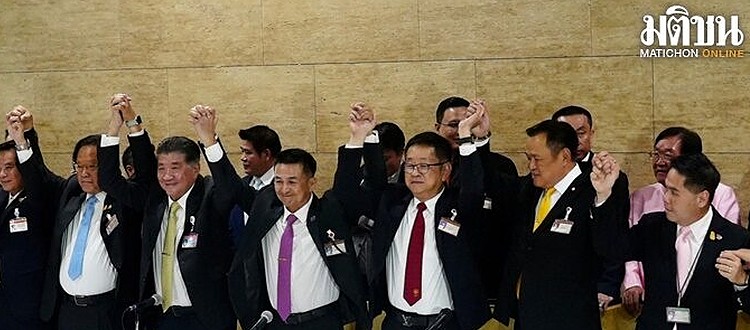
The new coalition government led by Pheu Thai was unveiled at a press conference this afternoon. There will be a total of eleven parties in the bloc, including United Thai Nation and Palang Pracharath, the political wings of the military junta.
Before the announcement, Paetongtarn Shinawatra, one of Pheu Thai’s most senior executives, acknowledged that collaborating with the two military parties was a violation of its principles. She told reporters yesterday: “Of course, Pheu Thai has [a] price to pay, that is the criticism of the people. We humbly accept [this] and apologise for making many disappointed and sad.”
Being propped up by Pheu Thai is a humiliation for the military, which deposed Thaksin Shinawatra — Paetongtarn’s father and the party’s de facto leader — in the 2006 coup and ousted Pheu Thai itself in another coup eight years later. But this is outweighed by the extraordinary staying power of the two military parties: despite losing the election, they are able to remain in government, and will each receive four cabinet posts.
The reputational damage caused by today’s announcement is far worse for Pheu Thai: for months, its executives had categorically ruled out working with either UTN or Palang Pracharath, and now it has signed a deal with both of them. At a separate press conference after the coalition announcement, Pheu Thai’s prime ministerial candidate Srettha Thavisin stressed that the two parties were needed to secure a majority government, “so, it is necessary to forget what we said.”
The coalition has 314 MPs, and the presence of UTN and Palang Pracharath makes it almost certain that senators will endorse Srettha in tomorrow’s prime ministerial vote. The election winners, Move Forward, have been relegated to the opposition alongside the Democrats and five smaller parties.
Before the announcement, Paetongtarn Shinawatra, one of Pheu Thai’s most senior executives, acknowledged that collaborating with the two military parties was a violation of its principles. She told reporters yesterday: “Of course, Pheu Thai has [a] price to pay, that is the criticism of the people. We humbly accept [this] and apologise for making many disappointed and sad.”
Being propped up by Pheu Thai is a humiliation for the military, which deposed Thaksin Shinawatra — Paetongtarn’s father and the party’s de facto leader — in the 2006 coup and ousted Pheu Thai itself in another coup eight years later. But this is outweighed by the extraordinary staying power of the two military parties: despite losing the election, they are able to remain in government, and will each receive four cabinet posts.
The reputational damage caused by today’s announcement is far worse for Pheu Thai: for months, its executives had categorically ruled out working with either UTN or Palang Pracharath, and now it has signed a deal with both of them. At a separate press conference after the coalition announcement, Pheu Thai’s prime ministerial candidate Srettha Thavisin stressed that the two parties were needed to secure a majority government, “so, it is necessary to forget what we said.”
The coalition has 314 MPs, and the presence of UTN and Palang Pracharath makes it almost certain that senators will endorse Srettha in tomorrow’s prime ministerial vote. The election winners, Move Forward, have been relegated to the opposition alongside the Democrats and five smaller parties.
